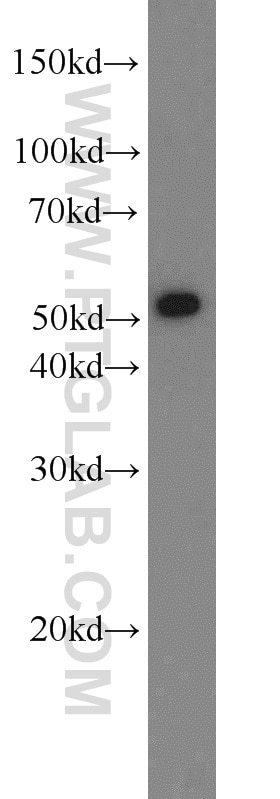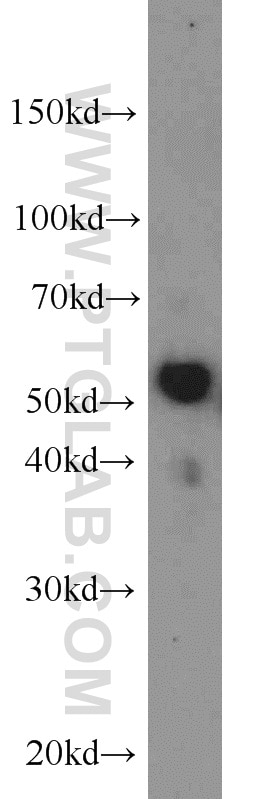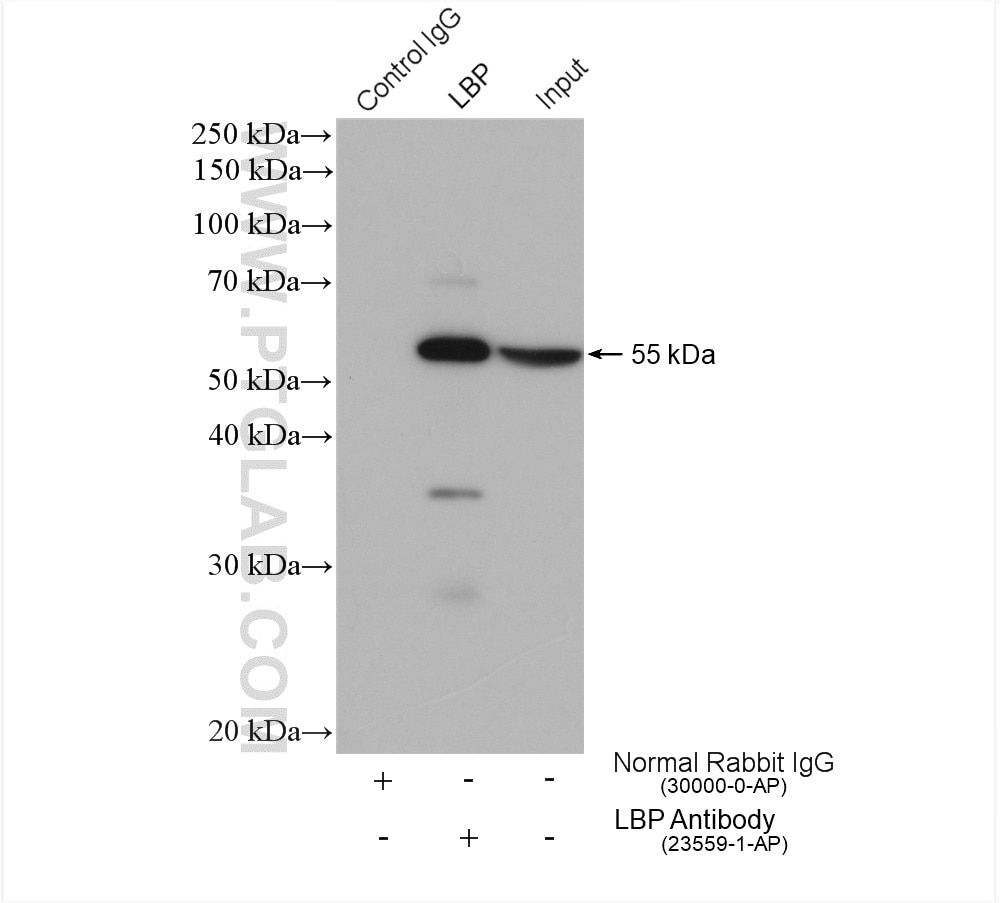LBP Polyclonal antibody
LBP Polyclonal Antibody for IP, WB,ELISA
Host / Isotype
Rabbit / IgG
Reactivity
human, mouse, rat and More (1)
Applications
WB, IP, IHC, IF, ELISA
Conjugate
Unconjugated
Cat no : 23559-1-AP
Synonyms
Validation Data Gallery
Tested Applications
| Positive WB detected in | mouse liver tissue |
| Positive IP detected in | mouse liver tissue |
Recommended dilution
| Application | Dilution |
|---|---|
| Western Blot (WB) | WB : 1:500-1:2000 |
| Immunoprecipitation (IP) | IP : 0.5-4.0 ug for 1.0-3.0 mg of total protein lysate |
| It is recommended that this reagent should be titrated in each testing system to obtain optimal results. | |
| Sample-dependent, Check data in validation data gallery. | |
Published Applications
| WB | See 6 publications below |
| IHC | See 1 publications below |
| IF | See 1 publications below |
Product Information
The immunogen of 23559-1-AP is LBP Fusion Protein expressed in E. coli.
| Tested Reactivity | human, mouse, rat |
| Cited Reactivity | human, mouse, rat, bovine |
| Host / Isotype | Rabbit / IgG |
| Class | Polyclonal |
| Type | Antibody |
| Immunogen | LBP fusion protein Ag13485 |
| Full Name | lipopolysaccharide binding protein |
| Calculated Molecular Weight | 481 aa, 53 kDa |
| Observed Molecular Weight | 53-60 kDa |
| GenBank Accession Number | BC022256 |
| Gene Symbol | LBP |
| Gene ID (NCBI) | 3929 |
| RRID | AB_11232597 |
| Conjugate | Unconjugated |
| Form | Liquid |
| Purification Method | Antigen affinity purification |
| Storage Buffer | PBS with 0.02% sodium azide and 50% glycerol pH 7.3. |
| Storage Conditions | Store at -20°C. Stable for one year after shipment. Aliquoting is unnecessary for -20oC storage. 20ul sizes contain 0.1% BSA. |
Background Information
LBP (lipopolysaccharide-binding protein) is an acute-phase protein, predominantly synthesized by hepatocytes. It is present in normal serum at concentrations of 5 to 10 μg/ml, rising up to 200 μg/ml 24 h after induction of an acute-phase response. LBP binds to the lipid A moiety of bacterial lipopolysaccharides (LPS), a glycolipid present in the outer membrane of all Gram-negative bacteria, and acts as an affinity enhancer for CD14, facilitating its association with LPS. (PMID: 9665271; 11598069)
Protocols
| Product Specific Protocols | |
|---|---|
| WB protocol for LBP antibody 23559-1-AP | Download protocol |
| IP protocol for LBP antibody 23559-1-AP | Download protocol |
| Standard Protocols | |
|---|---|
| Click here to view our Standard Protocols |
Publications
| Species | Application | Title |
|---|---|---|
Antioxidants (Basel) Antioxidative Self-Assembling Nanoparticles Attenuate the Development of Steatohepatitis and Inhibit Hepatocarcinogenesis in Mice | ||
Front Microbiol Proteomics Analysis of Exosomes From Patients With Active Tuberculosis Reveals Infection Profiles and Potential Biomarkers. | ||
J Proteomics Characterization of bovine mammary gland dry secretions and their proteome from the end of lactation through day 21 of the dry period. | ||
Nutrition Branched-chain amino acids protect the liver from cirrhotic injury via suppression of activation of lipopolysaccharide-binding protein, toll-like receptor 4, and signal transducer and activator of transcription 3, as well as Enterococcus faecalis translocation | ||
Eur J Pharmacol Chromofungin, a chromogranin A-derived peptide, protects against sepsis-induced acute lung injury by inhibiting LBP/TLR4-dependent inflammatory signaling | ||
PLoS One Macrophage specific restoration of the Nrf2 gene in whole-body knockout mice ameliorates steatohepatitis induced by lipopolysaccharide from Porphyromonas gingivalis through enhanced hepatic clearance |




